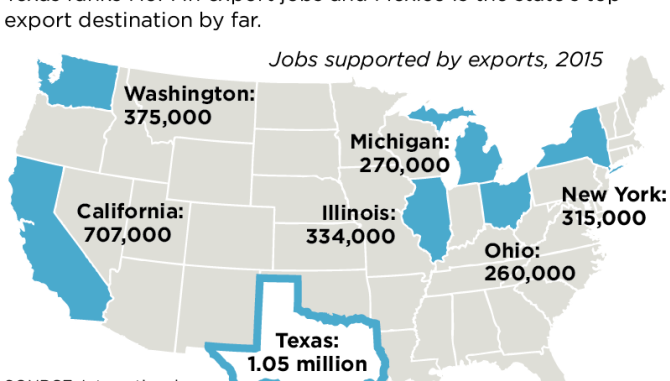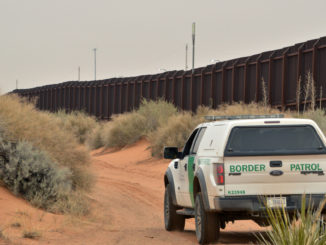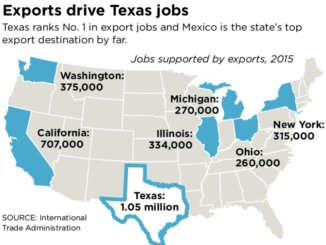
Donald Trump pledged in his inaugural address to stand up for the forgotten man and woman. But if the 45th president destroys the North American Free Trade Agreement in an attempt to rescue some Americans, millions more—including many who voted for him—could be added to the nation’s economically forgotten souls.
The very red state of Texas could suffer the most. Over 23 years it has worked to adapt to open commerce with its southern neighbor. Production sharing in manufacturing with counterparts across the Mexican border has boosted productivity, and a sharp increase in U.S.-Mexico trade at Texas land and sea ports has generated big export gains for the Lone Star State.
Nafta has made Texas more globally competitive. It hasn’t happened without some pain, particularly in border cities. Yet without the agreement, Texas arguably would have found it more difficult, on the employment front, to adjust to the acceleration in manufacturing automation that hit the U.S. during the same period.
President Trump, who was a Democrat for most of his life, uses the metaphor of the forgotten man in much the same way President Franklin Roosevelt did during the 1930s. Both can be viewed as champions of the fellow who has fallen on hard times and cannot seem to recover. The Trumpian approach to helping the “little guy” would also be familiar to FDR: Make the economy less free.
Yet as Amity Shlaes explains in her 2007 book, “The Forgotten Man,” that term originated with Yale professor William Graham Sumner. In his 1883 essay the forgotten man is the one who is passed the bill—unnoticed—when do-gooders propose “measures of relief for the evils which have caught public attention.”
Sumner didn’t name names. He simply described the injustice of A and B getting together to help X with some new law. C isn’t in on the plan but he carries the burden. “Such is the Forgotten Man,” Sumner wrote. “He works, he votes, generally he prays—but he always pays—yes, above all, he pays.”
In Mr. Trump’s war on globalism, Texas is brimming with Cs—hard-working Americans who have adjusted to freer trade and now find that A and B want to change the rules as a favor to X. There are millions more Cs all over the U.S.
Federal Reserve Bank of Dallas economist Jesus Cañas provides a useful profile of post-Nafta Texas in a 2016 report “Texas Border Cities Illustrate Benefits and Challenges of Trade.” The report says 710,000 U.S. jobs were lost between 1994 and 2014 “as a result of increased imports from Mexico and Canada or due to shifts in production.” Texas, Mr. Cañas writes, was the second most-affected state—in absolute numbers of jobs lost—behind North Carolina and ahead of California. Texas border cities, where manufacturing had been “heavily concentrated in low-value-added industries,” were hit hard.
Yet with more competition came increased trade, investment and technological change, all of which helped reshape the Texas economy. And cities along the border “went on to gain far more employment than what they lost” due to changes from Nafta.
Texas’ exports to Mexico—measured not by where the products are made but by where their journey abroad begins—increased by 236% from 1994 to 2015. “A significant share of this trade,” Mr. Cañas writes, “is in intermediate products—goods destined for assembly or other processing after which they are imported back into the U.S.” Mexico is Texas’ top export market, taking 40% of what the state sends abroad.
Mr. Cañas notes that the blue-collar workers most affected by Mexican imports have “experienced substantially lower wage growth than their counterparts in other industries.” But he observes that the metropolitan areas that lost the most jobs due to Nafta have benefited the most from increases in foreign direct investment. They also benefit from “rising living standards on the Mexican side of the border,” i.e., new customers with money.
Like the rest of the country, Texas’ employment is shifting from manufacturing to “other sectors such as business services,” Mr. Cañas writes. The state’s manufacturing employment is down 9% since Nafta implementation but manufacturing output grew 4.1% per year between 1997 and 2015.
“Manufactured goods exports supported an estimated 990,000 jobs in Texas in 2015,” the report says. The state “gained” more than four million jobs from 1994 to 2015, a period of rising automation and free trade, while real per capita incomes grew to $47,000 from $30,000.
Mr. Trump’s proposal to build new barriers to trade with Mexico ignores the harm that is sure to come to the armies of American factory workers, entrepreneurs and suppliers of business services who buy and sell across the border. Mr. Trump forgets these men and women at his own political peril.



